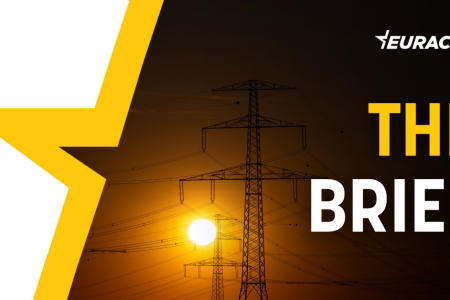
While hopes are low for COP29 climate negotiations which kick off today, the global decarbonisation drive now has momentum of its own and will continue irrespective of the outcome in Azerbaijan.
Last week’s US presidential elections were very different from the COP29 global climate talks, but the feelings were the same: A queasy mix of hope and fear and, underneath it all, a nagging sense of being overwhelmed by forces we are too small to resist.
2024 encapsulates these mixed emotions. It is the year in which we will almost certainly pass the 1.5°C threshold, but also the year in which maybe, just maybe, we manage to peak global energy-related greenhouse gas emissions.
However, COP29 does not look promising, as few world leaders will attend. There will be no von der Leyen, Macron, Scholz, Xi, Modi, or Biden, and it will take place under the shadow of Trump, who has promised to withdraw the US from the Paris Agreement.
But even if this is not a seminal COP, other forces can keep the wind in the sails of climate action.
The solar revolution continues. Even without climate consideration, solar power’s cheapness and ubiquity mean that clean energy will dominate new energy in the coming decades.
Batteries and electric vehicles are now experiencing a similar phenomenon. While European carmakers are feeling the pain of the transition, few, if any, claim that today’s polluting fossil fuel cars will be a big part of daily life in the future.
Where technological advances reshape what’s possible, politicians take note. For example, many centre-right leaders, historically not the most environmentally conscious bunch, are now embracing climate action.
It was heartening to see incoming climate commissioner Wokpe Hoekstra and his new transport colleague Apostolos Tzitzikostas, both EPP, staunchly defend decarbonisation in their hearings in front of MEPs last week.
Partially, this is simply a recognition of the already-too-tangible impacts of climate change.
Equally, it stems from their realisation that clean energy offers a path to continued prosperity and security. ‘Green growth’ may be a slogan, but it is also an objective reality.
Mixing climate and economic interests opens up other options to drive global decarbonisation.
Currently, we rely on the multilateral approach of COPs, where all countries come together and painfully try to find consensus. But when decarbonisation is an economic goal, there are more options.
Smaller groups of like-minded countries can work together, like the Climate Club, which includes the EU and approximately 50 other countries.
Furthermore, trade relations are becoming channels to drive international decarbonisation.
The EU is also proceeding with its carbon tariff on steel, electricity, aluminium, and hydrogen imports. This tariff will favour exporters with their own domestic carbon tax and, the Commission hopes, encourage other exporting countries to create their own carbon pricing.
Success is not guaranteed. China, the world’s largest emitter, is not a fan of Europe’s carbon tariff and wants to make its objections a key focus of COP29.
But China is already a global giant in clean energy technology and knows that a decarbonising world is in its interests. The US is about to cede its climate leadership role again. China, whose emissions are on the verge of peaking, could enter the vacuum.
To be clear, COP29 is still hugely important, particularly in addressing the crucial issue of climate finance. Whether this year’s event succeeds or fails, the world will continue its long, stumbling, imperfect efforts to protect a planet worth living on.
We give you energy news and help invest in energy projects too, click here to learn more






